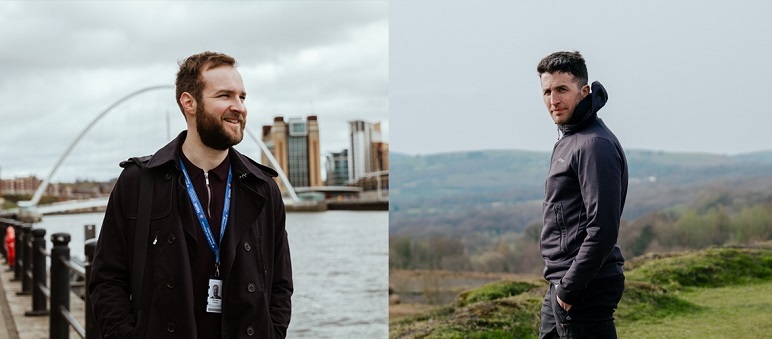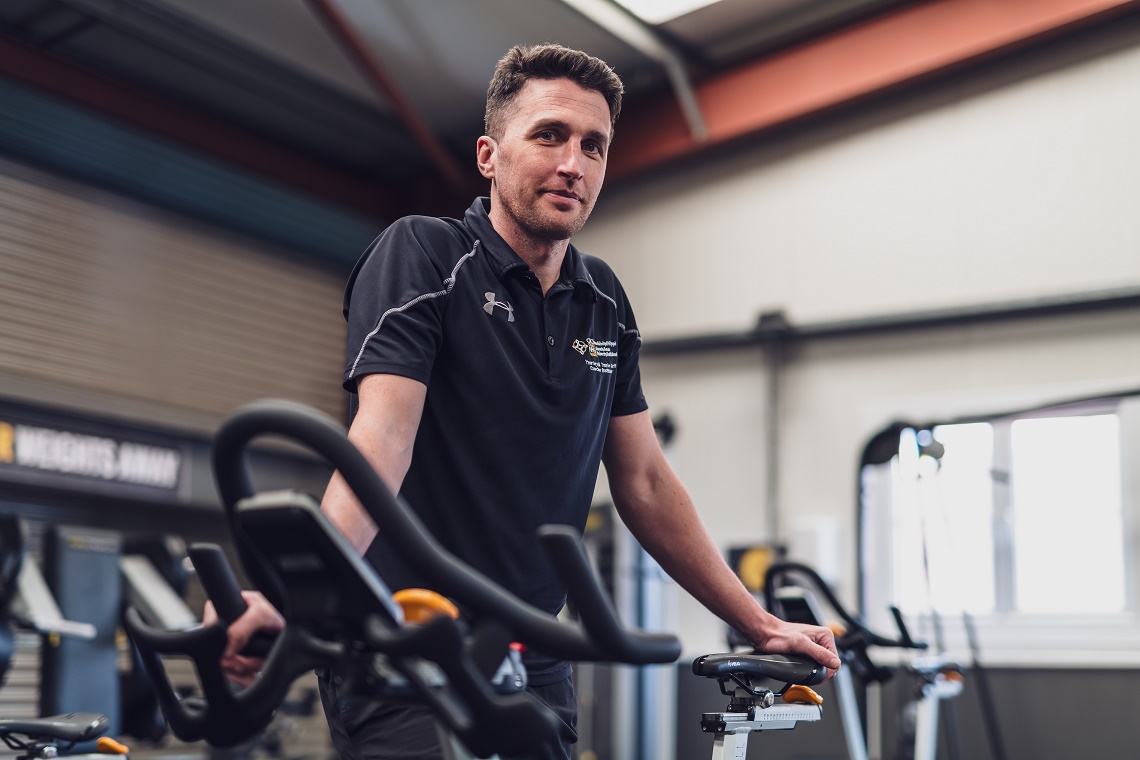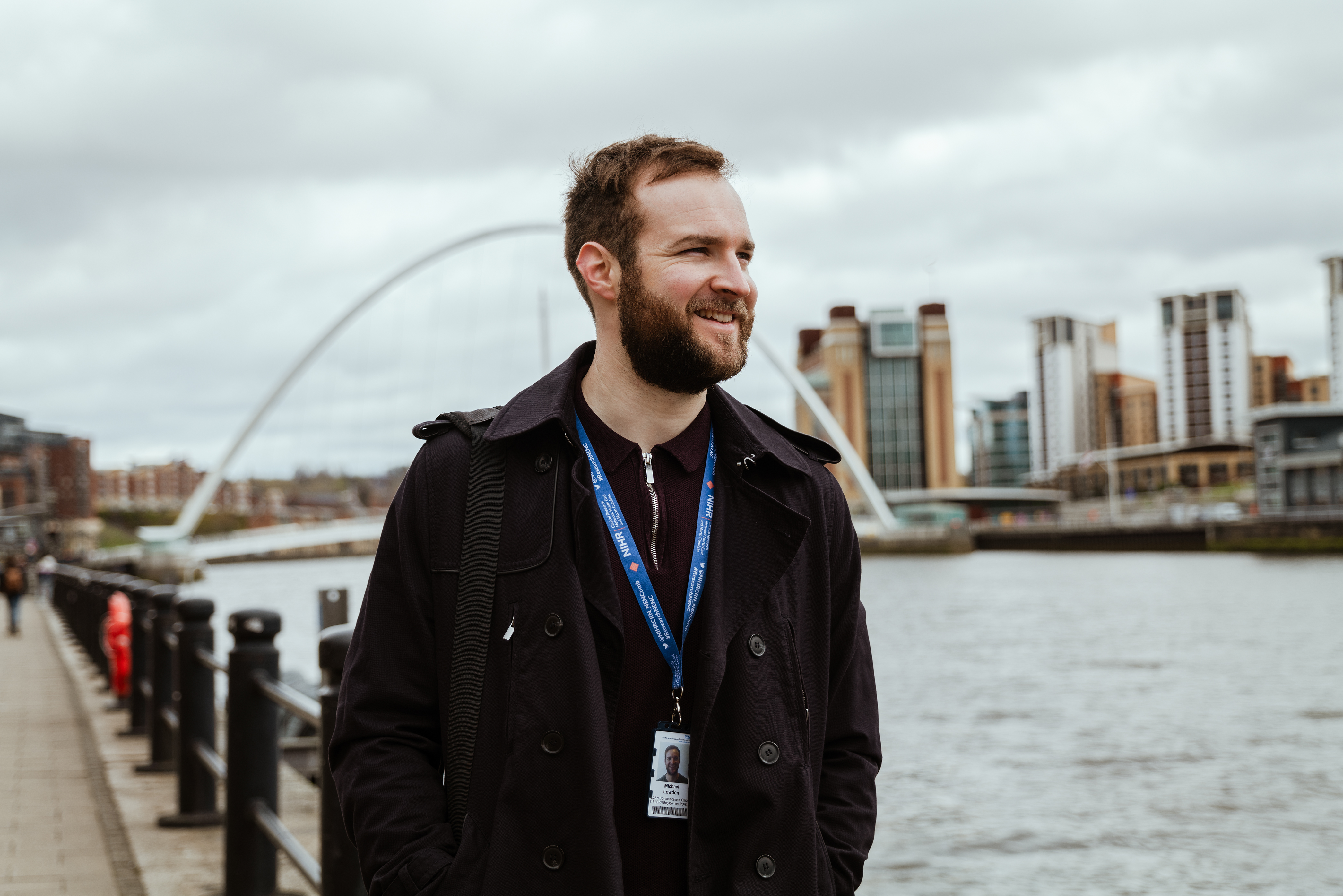The NIHR and NHS set up the NHS COVID-19 Vaccine Research Registry and put out the call for volunteers to help them find which potential vaccines work best – and hundreds of thousands signed up.
We spoke to two of these vaccine volunteers to learn how and why they took part – and find out what advice they have for other aspiring research participants.

What motivates research volunteers?
Brian and Michael have never met. They live at opposite ends of the country, and their day jobs are very different – with Michael working for the NIHR as a Communications Manager, promoting research opportunities, and Brian for Aneurin Bevan University Health Board in Wales as a Cardiac Rehabilitation Exercise Practitioner. But despite their differences, Brian and Michael have one amazing thing in common; they’ve both taken part in critical healthcare research to combat the COVID-19 pandemic.
And though both work in healthcare-related fields, their reasons for participating in COVID-19 vaccine trials were more personal than they were professional. “It was the first time in my life that I haven’t felt in control,” says Brian, who took part in the Oxford/AstraZeneca vaccine study. “Everything was up in the air. So for me it was playing a tiny little part in that chain of getting the vaccine through to completion, to hopefully get back to a state of normality.”
Michael, who was involved in the Phase II trial for Valneva, also felt that doing just “a little bit” to make a huge difference was an easy decision to make. “I felt it was a no brainer,” Michael says. “Knowing that I’m part of the one million people who have taken part in COVID research since last year makes me really proud.”
Why participating doesn’t have to be a hassle
Some people may worry about what health research entails – but both Michael and Brian found the process to be convenient to fit around their lives and hassle free. “It wasn’t disruptive at all,” Michael says, recalling the nature of his study, which included filling out a five minute questionnaire every night for the first 10 days after receiving the vaccine. “I was never rushing around – in fact with working from home it was a good excuse to get out of the house!”
Brian, too, found it easy to fit volunteering around his life. “It wasn’t a huge commitment,” he says of his 12-month study. “I’d go to the research centre and they’d take maybe an hour of my time, then I wouldn’t have to go back for maybe six weeks… I’ve got six more weekly tests to do, but I’m happy to go as far as they need me.”
The idea that health research has to take up a significant amount of time – and that it involves a lot of travel and time spent in hospitals – is off-putting for many would-be volunteers. But as both Brian and Michael found, this doesn’t always have to be the case. There are many different kinds of health research, and whether you’re up for taking part in a vaccine trial like these, or you’ve only got time to answer a survey, there’s a way for almost everyone to get involved.

Care and support for research volunteers
Volunteers in research are never asked to do anything they’re not comfortable with. In fact, Brian says that his family were more nervous about him taking part in the trial than he was. “There’s an awful lot of misconceptions about research,” he points out. “But from taking part I felt I could explain the facts to my family, rather than the misconceptions and the myths.”
Michael also found that contributing to research helped him reassure his loved ones, thanks to the thorough detail which the research team had gone to in order to make sure he knew what was involved. “My partner and parents were worried, especially about any potential side effects. But I showed them the information sheets – they break down everything about the number of people being involved in the study, what’s in the vaccine, all the visits you’d have, what’s in the kit you receive… it was well detailed.”
The level of care and support that Michael received isn’t unusual in a health research trial. Making sure that volunteers are fully informed before participating is a key focus for research teams, and studies have to pass strict ethical and regulatory checks before they can go ahead. This commitment to participant comfort was also reported by Brian, who recalls getting all his questions answered on his very first appointment. “It felt like a really safe environment to be in,” he says. “I didn’t really feel nervous – I suppose I felt intrigued, and hopeful that my small contribution would make a difference.”

Being part of a lasting legacy
Since taking part in the Oxford/AstraZeneca trial, Brian’s family have been fully won over by the benefits of volunteering for health research. “My mother thinks I’m a legend,” he says. “My family are all really proud – they think I’m over here in Wales saving the world!” This enthusiasm is more than shared by Michael, who is proud to be part of the “lasting legacy” of volunteering and making things better for the future.
So what advice do these volunteers have for anyone else thinking of lending their time to health research? “Inform yourself as much as you can before you start,” says Brian. “The patient info sheet is very detailed and easy to understand, so read it thoroughly to see what it involves. I knew exactly what to expect and what I was going to do – it was all very clear.”
“Get the right information so you can make an informed choice,” agrees Michael. “No one’s forcing you to get involved – but if you read up and see the benefits, you’ll see that there’s no hard work in it really – you’re there just to help.” Michael’s experience has also enriched his work, as he can now put himself in the shoes of the volunteers he helps to recruit and better understand the researchers he supports. “Now that I’ve been in that role, I can relate to the efforts needed from each side.”
“It’s been a resoundingly positive experience,” adds Brian, who has continued his volunteering work and is now actually administering vaccines on weekends. “It will be nice to get back to a stage where we don’t have to think about it anymore, where we can greet people and give them hugs, and do all the things we’re supposed to do as human beings.”
With COVID-19 research still ongoing, there are many different opportunities to get involved. Find out more about vaccine research, sign up to the NHS COVID-19 Vaccine Research Registry or read frequently asked questions about taking part in vaccine studies.
You could be part of the next amazing breakthrough.




